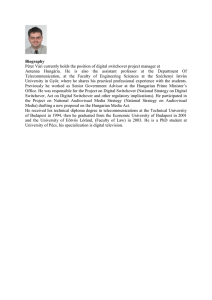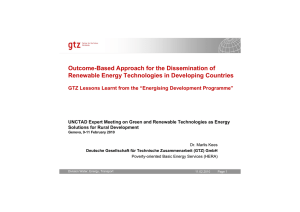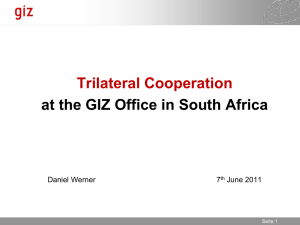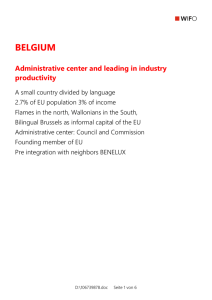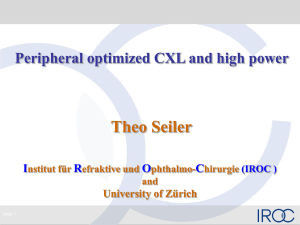1 The CISAC case "Challenges and experiences”
advertisement
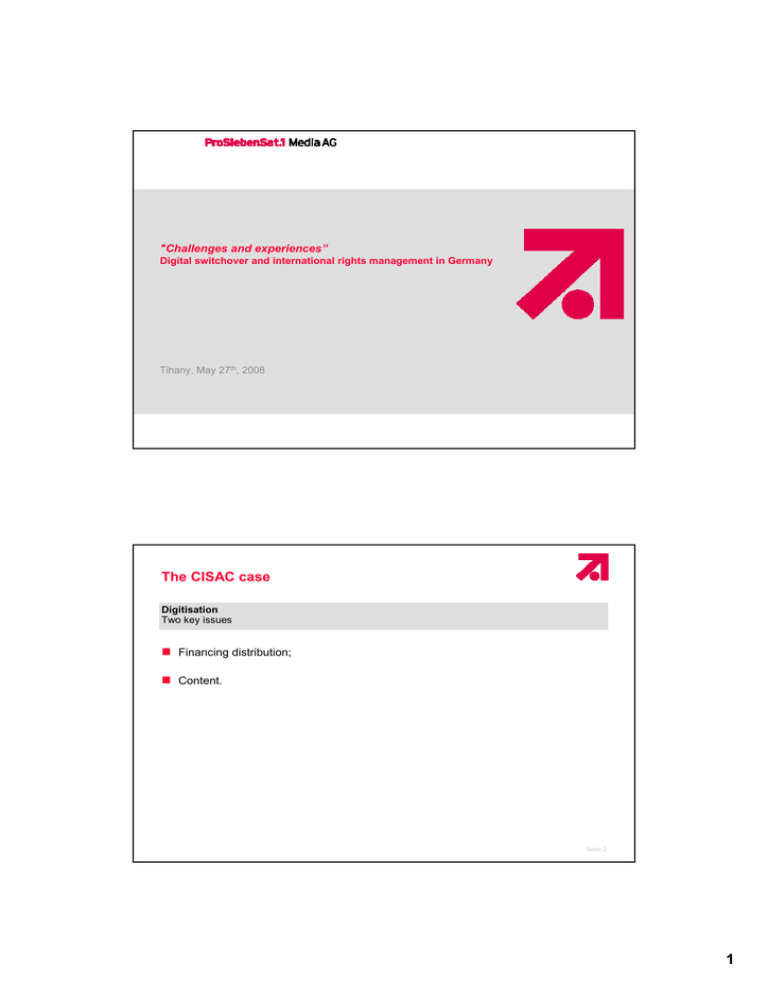
"Challenges and experiences” Digital switchover and international rights management in Germany Tihany, May 27th, 2008 The CISAC case Digitisation Two key issues Financing distribution; Content. Seite 2 1 Supporting the Digital Switchover Promoting DVB-T in Germany – how NOT to do it. Seite 3 Supporting the Digital Switchover Addressing transition problems If markets fail to drive digitisation ⇒ Call for Public Intervention: Regulation (e.g. setting switchover dates, limiting life-time of licenses), Financial support to consumers, Information campaigns, Subsidies to overcome a specific market failure or to ensure social or regional cohesion. Public Intervention = Potential conflict with the EC rules on State Aid Promotion of Digitisation ≠ Automatic justification for distortions of competition. Seite 4 2 Supporting the Digital Switchover Digitisation Addressing transition problems in Germany Funding in Germany: 3 x State support for Digital Switchover 3 x Support was declared illegal. DVB-T funding in Berlin & Brandenburg The “Leading Case” on how NOT to do it. Seite 5 Supporting the Digital Switchover The Berlin-Brandenburg case What happened? Berlin & Brandenburg media agency support for DVB-T (only): ProSiebenSat.1 and RTL to broadcast via DVB-T for 5 years, irrespective of coverage. Contribution to transmission costs for five years (approx. EUR 4 million): ProSiebenSat.1: EUR 330,000/a = EUR 82,500/channel; RTL: EUR 265,000/a = EUR 66,250/channel; Local TV FAB & BBC World: EUR 65,000/a each. Eurosport, Viva Plus and DSF (not broadcasted terrestrially before): EUR 65,000 each (one year license only). Seite 6 3 Supporting the Digital Switchover The Berlin-Brandenburg case The Commission’s assessment Economic Advantage [+] ⇒ Support for Operating Costs, not compensation for loss of analogue license: Aid for broadcasters that did not even broadcast terrestrially before; Aid even for broadcasters whose analogue license was due to expire anyway; Aid even to broadcasters with new digital licenses (P7S1, RTL even got extra channels); Payment exceeded switchover period. State Resources [+] ⇒ Grant by Regulator; Selective Aid [+] ⇒ Funding for DVB-T only; Grant without (!) prior notification to Commission ⇒ Automatic infringement. Seite 7 Supporting the Digital Switchover The Berlin-Brandenburg case The Commission’s guidance Market Failure may be addressed by public intervention. “Coordination problem”: Market players must agree on timetable to ensure short switchover period; “Positive externalities” (the “Egoism Problem”): Social benefit > Private benefit of incumbents. Extra channels/services = Extra competition = Extra business risk = No incentive for incumbents to switch. Seite 8 4 Supporting the Digital Switchover The Berlin-Brandenburg case The Commission’s guidance Onus is on Member States to show: financial aid is the most appropriate instrument to address such market failure (Incentive); financial aid is limited to the minimum necessary; Positive overall balance (Proportionality): No undue distortion of competition. Seite 9 Supporting the Digital Switchover DVB-T Funding in Berlin-Brandenburg = Not necessary to support the digital switchover Commission on the “Coordination Problem”: Public funding for DVB-T not necessary to overcome the “coordination problem”: Regulator can solve coordination problem by setting a common switchover date. Commission on the “Egoism Problem”: Cost Reduction: Digital transmission costs < Analogue transmission costs. Incentive to switch: Extra channels/services = Extra business chances. No “egoism problem”. Seite 10 5 Supporting the Digital Switchover DVB-T Funding in Berlin Brandenburg = Unjustified departure from the principle of technological neutrality Commission: “Digitisation will not be achieved by promoting a single transmission channel.” No structural problems ⇒ No need to promote inter-network competition. DVB-T not clearly superior technological solution to other platforms; Measure not focused on any innovative media or telecom services in particular; Successful launch of DVB-T without public support in other German Länder (Hessia); Roll-out of other platforms, e.g. DSL, at risk. Seite 11 Supporting the Digital Switchover Signal transmission via DVB-T A cultural mission? Art. 87 (3) lit. d EC Treaty: Justification for aid promoting culture and heritage conservation … Art. 86 (2) EC Treaty: Exemption from competition rules for „services of general economic interest“. Service of general economic interest carried out by several private broadcasters? Seite 12 6 Supporting the Digital Switchover Dont’s Discrimination: DVB-T is NOT “more equal” than other transmission channels. Operating Costs: Do not relieve companies from their operating costs, i.e. from their transmission costs. Do not “forget” to notify. Seite 13 Supporting the Digital Switchover Do’s Transparency, Necessity, Proportionality and Technological Neutrality. Technology Neutrality; Support pilot projects, R&D, roll-out of network in areas with insufficient coverage, development of new digital services (e.g. EPG, mobile applications); Grants to consumers, e.g. to buy Set-Top-Boxes/decoders; Compensate private broadcasters for additional transmission costs during simulcast or early expiry of their analogue licenses; Grants to public broadcasters to promote universal coverage on all transmission platforms. Seite 14 7 Supporting the Digital Switchover Criticism I Commission’s approach was too formal Small funds – Limited distortion of competition; cable and sat. already highly developed, no need for funding. Benefits were passed on to network operator, no economic advantage. Set-Top-Box Funding is more expensive (especially if technologically neutral): Germany (Berlin-Brandenburg + NRW + Bavaria): Approx. EUR 13.2 million over 5 years; Italian funding for STB via tax deduction: Total: EUR 40 million in 2007; EUR 200 / STP (max.). Digitisation Fund Austria: Aid STB (DVB-T / Cable): EUR 4.39 million in 2007. STB Funding much more distortive as consumers may indeed switch. Seite 15 Supporting the Digital Switchover Criticism II Commission not competent to rule on local cases Proposed Aid was regional (Berlin-Brandenburg; Köln/Bonn; Düsseldorf/Ruhr). Effect on trade between Member State? The Commission: “Yes!” Private broadcasters and the network operator are in international competition with other undertakings. There is competition between terrestrial, cable and satellite operators for endusers in different Member States. DVB-T Funding justified as promotion of an “important project of common European interest” (Article 87(3) lit. b EC Treaty)? The Commission: “No!” “The promotion of digital terrestrial TV specifically in two urban areas of North Rhine-Westphalia cannot be considered as ‘an important project of common European interest’.” [sic!] Seite 16 8 Supporting the Digital Switchover The case of Hungary The 2007 Hungarian Switchover Act provides for different frequency fees for digital and analogue broadcasters: Digital broadcasters gets a discount; Analogue broadcasters pay more (or at least do not get a discount). In addition, it is also provided that expenses of digital switchover would be in part covered from frequency fees collected from analogue broadcasters. Reduced regulatory fees for digital licenses replacing analogue licenses (UK case) = No Aid? Digitisation ⇒ More capacity ⇒ Less scarcity ⇒ Reduced market “value” of license. No “benefit” (i.e. no extra) for recepient. Seite 17 Regulatory Affairs & Distribution The CISAC case Seite 18 9 The CISAC case Digitisation Content is king Digitalisation = More space = More demand for content. Getting content in the digital world: Clearing copyright. Seite 19 The CISAC case Collective Rights Enforcement in the EEA CISAC CISAC = Worldwide Association of collecting societies (“CS”) representing right-holders (authors and composer). Representing authors vis-á-vis users = Providing clearance of rights for users Performing right includes: Right to primary broadcasting; and Right to re-transmit the work of the author / composer. Mechanical right = Right to make a copy. Seite 20 10 The CISAC case Dreams of a broadcasting right user Choosing the one-stop-shop One-stop-shop for everything: Performing rights & Mechanical rights; Multi-repertoire (no withdrawals); For all countries; For all uses (Internet, cable and satellite); For all user. Being represented by the Collecting Society of choice, i.e. Competition between CS on price and quality; Lower costs. Seite 21 The CISAC case The reality No choice – no competition Each EEA CS holds global portfolio of musical works („multi-repertoire“): National one-stop-shop. But - Each EEA CS grants multi-repertoire licence for domestic market only: De facto monopoly of national CS – No competition between CS; No choice for right users and right owner. No international one-stop-shop for copyrights clearance; Multi-national broadcasting group must acquire rights country-by-country; Extra costs – extra effort. Seite 22 11 The CISAC case Well – isn’t that a cartel? Allocation of markets and customers between national collecting society Reciprocal representation contracts between all CS in the EEA (and the rest of the world) based on CISAC model agreement: Membership restrictions (Authors can’t chose): Authors must transfer their rights to „their“ national CS. Territorial restrictions (User can’t chose): Right user can only purchase rights from “his” local CS; CS only grant licenses for “its” territory. De facto monopoly for local CS (sometimes de jure) . Allocation of customers and territories = “Hardcore” antitrust infringement ?!? Seite 23 The CISAC case Is there somebody doing something about it? Law Enforcement in Slow Motion First complaint in 2000 [!] by RTL Group, against GEMA. Early 2006 [!], Commission issues Statement of Objection (“SO”). Possible restriction of competition: Membership restrictions (monopoly in the upstream market): Territorial restrictions (monopoly in the downstream market): Network effects of the agreements (completion between CS, barriers to entry): However, the Commission’s criticism is limited: Online, satellite and cable usage only. Seite 24 12 The CISAC case How did the Collecting Societies react? To remove antitrust concerns, CS offered modifications of agreements (commitments) Good: Lifting the membership restrictions – Authors can choose; Lifting the exclusive territorial restriction – Users can choose; EEA-wide multi-territorial licences grant possible covering portfolio of a CS! Bad: Commitments limited to performing rights! Caveats to prevent “powerful music users” from provoking a “race to the bottom” on royalties (CISAC). Seite 25 The CISAC case Extensive caveats destroy pro-competitive effects “Deny, delay, degrade.” Tariffs for multi-territorial licenses agreed between CS = Price fixing. Country of destination principle for royalties Multi-territory license only by CS fulfilling extensive catalogue of requirements ⇒ Existing structures cemented, excluding efficient administration as driver for competition. Online: Multi-territory license only for Offering with multi-territorial target group ⇒ National websites excluded; For consumers ⇒ B2B rights users excluded. Satellite: Multi-territory license only for broadcasters with multi-territory target group (≥ 6% outside domestic area) ⇒ Multi-territory License only for CNN & Co., P7S1 channels would not qualify. Seite 26 13 The CISAC case Even worse … The end of the “One-Stop-Shop” Limitation to performing rights renders changes useless: Broadcasters need Performance & Mechanical rights – e.g. for broadcasting concerts (archiving not covered by performance right); Two-stop-shop: Broadcasters must still shop for mechanical licenses; New System more complex than old system. Right to exclude specific repertoire from reciprocal representation network: ⇒ Direct licensing for attractive repertoire (e.g. CELAS). ⇒ End of even the national “One-Stop-Shop”, ⇒ End of the World (Repertoire), ⇒ The end of the only advantages of the old system. Seite 27 The CISAC case The EU Commission’s Investigation A lesson in effective lobbying One year ago – on June 14, 2007 – the Commission published the proposed commitments of CISAC and its member societies and called for comments. Broad resistance prevented Commission from declaring the commitments binding. The case is still pending… Seite 28 14 The CISAC case EU Legislative Efforts A sophisticated international affair? A total mass? Or what? EU Commission first brought up the case for EU-wide licensing in April 2004. Mid-2005, Commission paper on collective cross border rights management: Do nothing (Option 1); Suggest improvements of cross-border cooperation btw. national CS in the EU (Option 2); Let right-holders chose the CS to manage their works across the EU (Option 3). Commission proposes Option 3. Seite 29 The CISAC case EU Legislative Efforts It ain’t over yet… March 2007: EP criticised Commission’s recommendation (“Lévai Report”): “‘Option 3’ to marginalise small country CS”; “Maintain international reciprocal agreements providing one-stop-shops for users”; “Apply country of destination principle to determine applicable tariffs.” Seite 30 15 The CISAC case Side effects in Hungary? Statutory Monopoly for Collecting Societies EU Commission called Hungary to terminate this statutory monopoly. Infringement of Article 43 EC Treaty: Right of Establishment; Infringement of Article 49 EC Treaty: Free movement of services. Measures taken by Hungary: Draft amendment of the Hungarian Copyright Act: Several CS may exist with respect to a particular right of a particular group of right-holders; However, right-holders may not be members of more than one CS at the same time; Foreign entities may register as CS in Hungary with respect to collective management of online rights ; However, foreign CS might not be able to clear online rights for Hungary, unless registered in Hungary; CS must be representative (CS must represent a significant part of the right-holders in the given area). Seite 31 Köszönöm a figyelmet ! Seite 32 16

